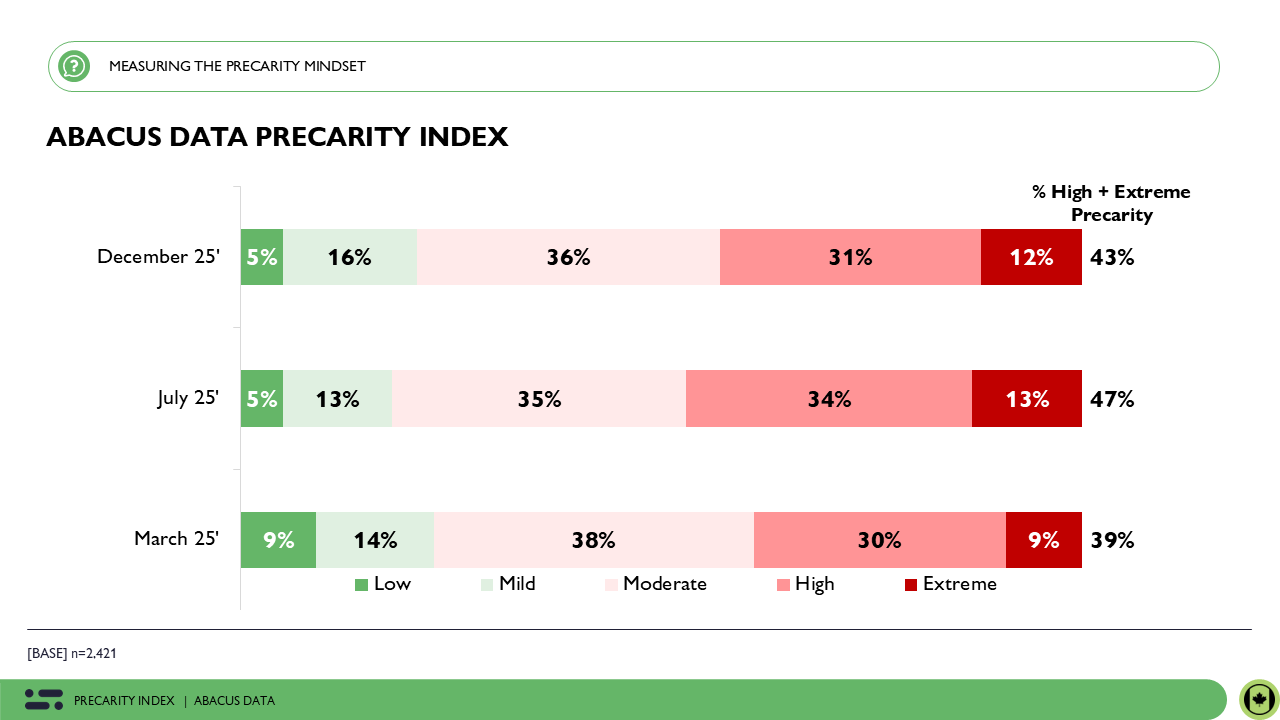What’s keeping Canadian millennials up at night?
April 5, 2018
Canadian Millennials have been coming of age in a rapidly evolving job market characterized by digitization, flexibility, and decentralization. More dynamic, but also less stable.
Gone are the days of long term, lifelong careers at big corporations with robust defined benefit pension plans. Enter the emergence of elastic, nimble, digitized companies with roles as flexible as they are precarious.
Along with the evolution of the marketplace comes greater accessibility to and expectations for higher education, which is in turn accompanied by greater post-secondary debt, and a mismatch between skills learned and skills sought by employers.
Couple this with an older generation of baby boomers sitting on a housing market that benefits existing homeowners and disadvantages new entrants, Millennials are coming of age operating in a new affordability paradigm. The protections and assumptions that educated baby boomer’s success and stability – go to school, get a job with benefits, start paying into a mortgage— and by extension what millennials were socialized to expect, are mismatched with present day realities when they enter the workforce.
These factors are a possible explanation for why there is a disconnect between an economy that Millennials acknowledge is healthy and growing, and tempered optimism when it comes to their feelings about their own personal future.
This finding comes from Abacus Data’s study of Canadian Millennials – Canada’s largest reoccurring syndicated publication dedicated to understanding the views of Canadians born between 1980 and 2000 and raised around the turn of the millennium (4000 interviewed annually).
Among other things, our survey found:
70% of Millennial Canadians rate the economy as doing well, while only 16% describe themselves as very optimistic about their personal future (52% are at least mostly optimistic).
80% identify themselves as middle class, but only half or fewer have access to basic protections we associate with the security of a middle-class life: 55% have access to drug insurance, 53% to dental insurance, 36% to an RRSP, and only 29% to an employer provided pension plan.
While the share of pension plan and RRSP ownership may be expected to increase significantly with age, only 45% of Millennials over 30 have an RRSP and a mere 37% of this same group have a pension plan provided by an employer.
When asked what government could do to help them, Millennials are united in their clear desire for a solution to housing affordability. This is a big priority for Millennials regardless if they are living in suburban, urban, or rural Canada. This priority breaks through the traditional “jobs” and “healthcare” preoccupation and is the focal point of Millennial discontent. In other words, this is a generation that is looking for relief on table stakes just like any other – fixing their unique economic pain points in their day to day lives, be it housing, cost of services covered by benefits plans, or making post-secondary education more affordable.
And they are looking to government to take big steps to fix their problems. This generation is more comfortable with big, interventionist government activism than allowing market forces to play their part, a reflection of how they feel this economic system fails to work for them.
Our study finds Millennials clearly prioritize spending over balanced budgets to tackle issues like alleviating income inequality. They believe corporations don’t pay their fair share of taxes and that government has a big role to play in redistributing that money.
Having lived through the 2008 Financial Crisis and a rise in housing costs, many are outright skeptical of the free market. When asked to indicate if they lean more towards one perspective or the other, only 46% suggested that capitalism is the best economic model we have, while 54% believe Canada would be better off with a more socialist system.
Housing affordability, cost of living, and an uncertain job market are the core worries of a generation that feel the current economic and political system leaves something to be desired. This feeling is so deeply held that upwards of one in three Millennials feel that their generation will not be better off than their parents’ generation. In particular, many Millennials believe their generation is more disadvantaged when it comes to attainable housing, retirement security, cost of living, and ease of finding employment, when they compare themselves to their parents’ generation.
While most Millennials want clear action on climate change, poverty alleviation, and more open immigration policies, micro-economic concerns reign supreme in their thinking and priorities, and these – like for generations past – will come first. Expect Millennials, now a major voting bloc to throw their considerable political weight around when looking to governments to solve these problems. The politics forged by their unique upbringing is ripe to disrupt the political assumptions of yesterday and change political norms that have for so long been catered to and shaped by baby boomers.



